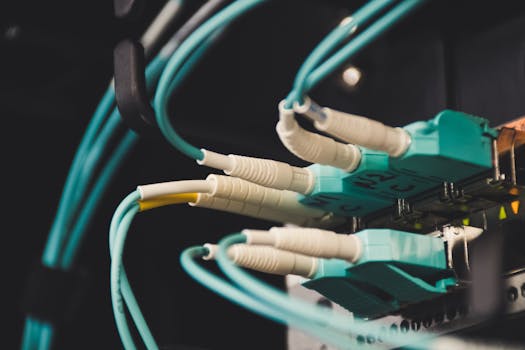From Copper to Fiber: The Revolution of Internet Infrastructure in Africa – A New Era of Connectivity

From Copper to Fiber: The Revolution of Internet Infrastructure in Africa – A New Era of Connectivity
From Copper to Fiber: The Revolution of Internet Infrastructure in Africa is an exciting development that has been gaining momentum in recent years. The internet infrastructure in Africa is undergoing a significant transformation, shifting from copper to fiber optic cables, revolutionizing the continent’s connectivity and digital landscape. This shift is expected to have a profound impact on the African economy, education, healthcare, and overall quality of life.
The African continent has long been plagued by slow and unreliable internet connectivity, hindering economic growth and development. However, with the advent of fiber optic technology, the continent is poised to take a giant leap forward. Fiber optic cables offer faster, more reliable, and secure internet connectivity, enabling Africans to access a wide range of online services, including education, healthcare, and financial services.
The Challenges of Copper Infrastructure
Copper infrastructure has been the backbone of Africa’s internet connectivity for decades. However, it has several limitations, including slow speeds, high latency, and vulnerability to damage and theft. Copper cables are also prone to signal degradation, which can result in poor internet quality and frequent outages. These challenges have hindered Africa’s ability to compete in the global digital economy, making it difficult for businesses to operate efficiently and for individuals to access online services.
The shift from copper to fiber optic cables is expected to address these challenges and provide Africans with fast, reliable, and secure internet connectivity. Fiber optic cables are made of thin glass or plastic fibers that transmit data as light signals, offering speeds of up to 100 Gbps. This is significantly faster than copper cables, which have a maximum speed of 1 Gbps.
The Benefits of Fiber Optic Infrastructure
The benefits of fiber optic infrastructure are numerous and far-reaching. With fiber optic cables, Africans will have access to fast and reliable internet connectivity, enabling them to participate in the global digital economy. This will create new opportunities for businesses, entrepreneurs, and individuals, driving economic growth and development. Fiber optic infrastructure will also enable Africans to access a wide range of online services, including education, healthcare, and financial services, improving their overall quality of life.
Fiber optic infrastructure will also have a significant impact on education in Africa. With fast and reliable internet connectivity, students will have access to a wide range of online educational resources, including e-learning platforms, online libraries, and educational videos. This will improve the quality of education in Africa, enabling students to compete with their peers globally.
Conclusion
In conclusion, the shift from copper to fiber optic cables is a significant development that is expected to revolutionize Africa’s internet infrastructure. With fiber optic cables, Africans will have access to fast, reliable, and secure internet connectivity, enabling them to participate in the global digital economy. This will create new opportunities for businesses, entrepreneurs, and individuals, driving economic growth and development. As the African continent continues to evolve, it is essential that we invest in fiber optic infrastructure to ensure that we are well-positioned to compete in the global digital economy.
The Future of Internet Infrastructure in Africa
The future of internet infrastructure in Africa is exciting and full of possibilities. With the advent of fiber optic technology, the continent is poised to take a giant leap forward. As more countries invest in fiber optic infrastructure, we can expect to see significant improvements in internet connectivity, driving economic growth and development. The African continent is also expected to see an increase in the adoption of emerging technologies, including artificial intelligence, blockchain, and the Internet of Things (IoT), which will further drive growth and development.
The African Union has also launched several initiatives to promote the development of internet infrastructure in Africa. The African Union’s Agenda 2063, for example, aims to promote the development of a single, unified digital market in Africa, enabling the free flow of goods, services, and ideas across the continent. The African Union has also established the African Telecommunications Union, which aims to promote the development of telecommunications infrastructure in Africa, including internet infrastructure.




